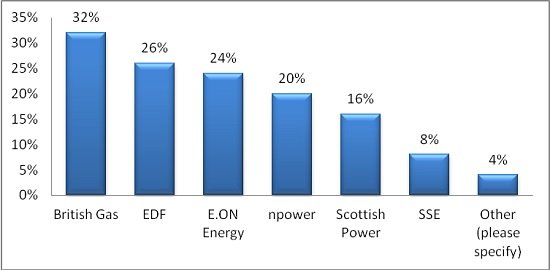Energy Switching Study
Energy Switching Study – lessons for all
In order to break the dominance of the big six, this will mean greater competition between suppliers to give smaller companies a chance to grow. Our research shows an early indication of this; those who have switched in the last 12 months are generally moving away from the big companies, citing saving money and poor customer service as the biggest motivations to do so.
Current market
The majority of the UK?s household energy is supplied by the ?big six?; British Gas, EDF, E.ON, npower, Scottish Power and SSE. Yet the rising price of energy which these companies charge, and the apparent poor levels of customer service provided, has resulted in widespread dissatisfaction amongst consumers and points towards a long overdue shake up in the industry.
The introduction of 3-day switching will force competition between energy suppliers and transparency in rates. Consumers will have clearer options when choosing the right supplier to suit them and an easier switching process.
Prevalence of switching
Excluding those who have changed provider as a result of moving home, just a quarter (26%) of UK adults have switched energy supplier in the last 12 months; 6% have switched gas, 5% electricity and 15% have switched both. Of those who haven?t switched, just a third (38%) have thought about doing so. Although most are eligible to switch supplier, this low incidence shows that people are not engaged with the energy market and are not shopping around for this as they would with other services.
Our research shows that the switching which has occurred in the last year has favoured smaller companies. As tariff rates between large and small suppliers can vary so much, new regulations such as companies publishing their wholesale prices and setting a limit on the number of tariffs available has forced transparency and improved accessibility for consumers. In light of this, we have found that just 4% of those who have switched in the last 12 months have decided to leave a company outside of the big six. With British Gas (32%) losing the most customers, closely followed by EDF (26%) and E.ON Energy (24%).
Chart: Previous suppliers of those who have switched:

Motivations and deterrents of switching
It comes as no surprise that saving money appears to be the strongest motivator in switching energy supplier. Over half (57%) of those who have done so in the last 12 months say the main reason they decided to switch was to save money. Similarly, for those who have thought about switching in the last 12 months, but not done so, the most common reason for not making the move was because there wasn’t a big enough incentive to move (23%). This is closely followed by those who said the main deterrent for them was that they simply didn’t believe it would make any difference to their bills.
As a major part of our household budget, UK consumers are long overdue a competitive energy market which works for them. Not only could they see a substantial drop in their bills, this will mean any other flaws in the service will be forced to improve. Small companies could benefit by learning from the mistakes of the big six, such as in customer service. We found that two in five of those who have switched cited the poor customer service (12%) or not feeling valued as a customer (7%) with their previous supplier as the main reasons they left. Also, dissatisfaction with how their account was looked after; 9% switched due to major errors on their account whilst 6% had unresolved complaints at their old supplier.


Experience of switching and likelihood to switch
The experience of switching so far is positive, with 82% describing the process as easy and half (51%) saying they have benefited from a level of saving which is better than they had initially expected.
In addition to engaging customers in the energy market, 3-day switching is likely to change public attitudes, which currently see them ruling out switching energy as something which causes a lot of hassle and is not worth it in the end. Current levels of interest show that just 16% expect to switch in the next year, however as the majority of those who have never switched energy suppliers are almost guaranteed to make a saving, this is set to rise with a more clear and easy process in place.





